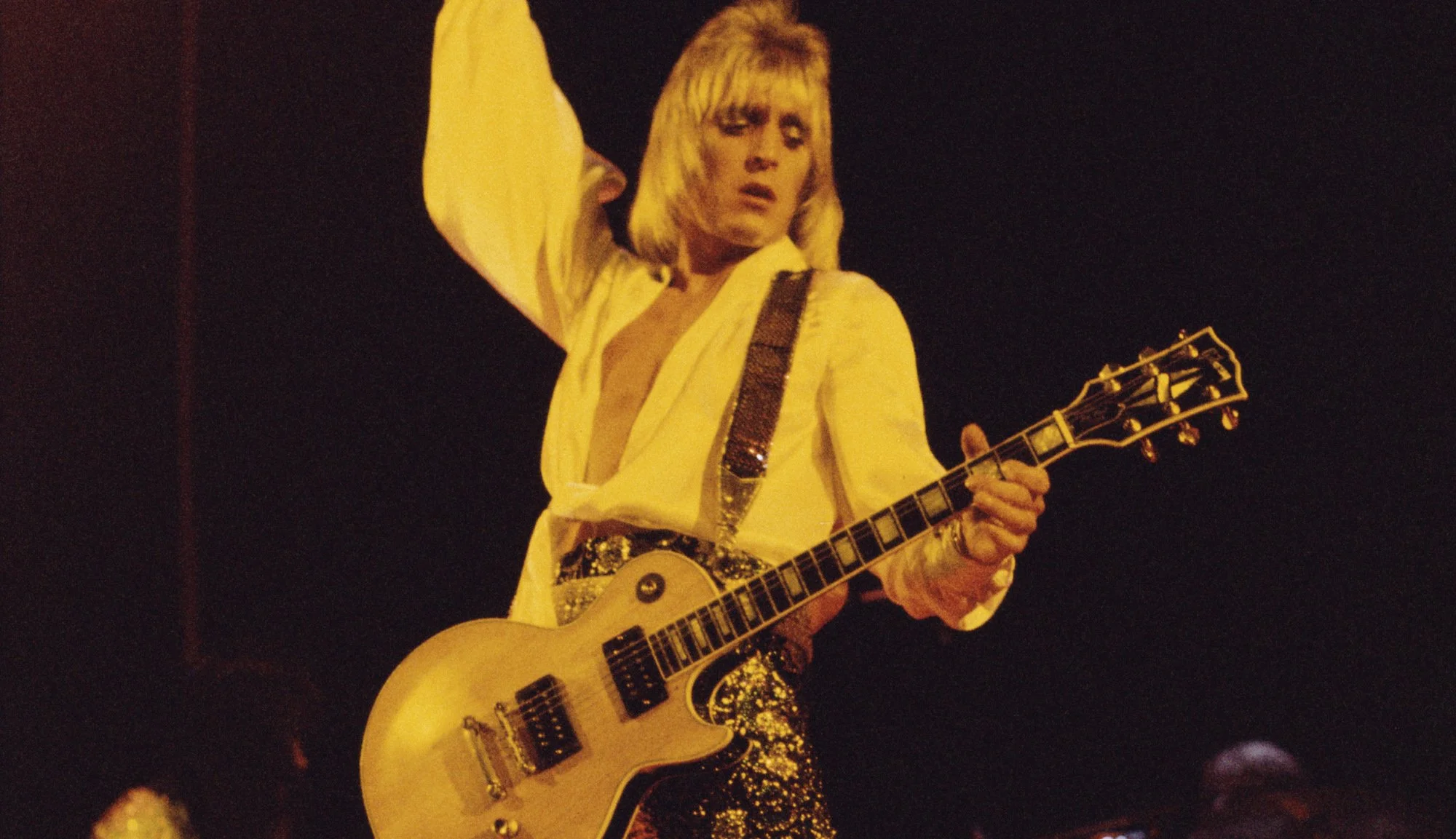Exploring the Innovation and Creativity of David Bowie's Iconic Guitarists
David Bowie worked with some of rock's most transcendent guitarists, giving them the space to expand their techniques, tones, and creative concepts through his music - all while maintaining their imprints and approaches. From Mick Ronson to Robert Fripp to Nile Rodgers, Bowie's guitarists have been instrumental in shaping his sound and pushing the boundaries of rock music. Each guitarist brought their unique flavour to Bowie's music, and he allowed them to explore their creative ideas while contributing to his vision.
Bowie's collaborations with guitarists like Mick Ronson, Robert Fripp, Earl Slick, Carlos Alamar, Adrian Belew, Reeves Gabriels, Nile Rodgers, Ricky Gardiner, Chuck Hammer, Gabriel Reeves, Mark Plati, David Torn, Gerry Leonard, Ben Monder, even himself, have left a lasting impact on the world of music. These guitarists have contributed to Bowie's sound in countless ways, from creating iconic guitar riffs to pushing the boundaries of guitar synthesis.
What's truly remarkable about Bowie's collaborations with his guitarists is that he invariably allowed them to explore their creative concepts while maintaining a cohesive sound. Bowie's music is a testament to the power of collaboration and the importance of giving musicians the space to explore their ideas.
Ultimately, David Bowie's music reflects his willingness to experiment, his openness to new ideas, and his ability to collaborate with some of the most innovative guitarists of his time. His music continues to inspire generations of musicians and fans alike, and his legacy as a true innovator in rock music will endure for years to come.
Mick Ronson
One of Bowie's most iconic collaborators was Mick Ronson. Ronson's guitar playing on tracks like "Ziggy Stardust" and "Starman" helped define the sound of the glam rock movement. Ronson's innovative use of guitar effects and distortion created a wall of sound that perfectly complemented Bowie's theatrical performances.
Robert Fripp
Another of Bowie's most significant collaborators was Robert Fripp. Fripp's experimental guitar work on tracks like "Heroes" and "Scary Monsters (And Super Creeps)" pushed the boundaries of what was possible in rock music. Fripp's use of unconventional chord structures and his willingness to experiment with different guitar tones helped Bowie create an innovative and timeless sound.
Earl Slick
Earl Slick is another guitarist who significantly contributed to Bowie's music. Slick's mighty riffs and dynamic solos on tracks like "Stay" and "TVC15" helped Bowie explore the new sonic territory. Slick's guitar work was always expressive and emotional, bringing a rawness and authenticity to Bowie's music.
Carlos Alomar
Carlos Alomar was Bowie's most consistent collaborator, having played the guitar on many of his albums. Alomar's funky rhythm guitar playing on tracks like "Fame" and "Golden Years" helped Bowie embrace a more soulful sound. Alomar's use of syncopated rhythms and his ability to blend different musical genres helped Bowie create a unique sound that was both accessible and experimental.
Adrian Belew
Adrian Belew was another guitarist who significantly impacted Bowie's music. Belew's use of guitar synthesisers and his ability to create complex guitar textures helped Bowie create a futuristic and otherworldly sound. Belew's guitar work on tracks like "Boys Keep Swinging" and "Fashion" added an element of unpredictability to Bowie's music, keeping fans coming back for more.
Reeves Gabriels
Reeves Gabriels is another guitarist who brought a unique flavour to Bowie's music. Gabriels' use of atmospheric guitar textures on tracks like "I'm Afraid of Americans" and "Heathen (The Rays)" helped Bowie create a sound that was both haunting and ethereal. Gabriels' guitar work always had a cinematic quality, adding drama and tension to Bowie's music.
Nile Rodgers
Nile Rodgers is perhaps best known for his work with disco legends Chic, but he also played the guitar on Bowie's classic album "Let's Dance." Rodgers' funky guitar playing on tracks like "Modern Love" and "China Girl" helped Bowie embrace a more danceable sound. Rodgers' use of syncopated rhythms and his ability to create infectious guitar hooks helped Bowie create some of his most commercially successful music.
Ricky Gardiner
Ricky Gardiner is another guitarist who significantly contributed to Bowie's music. Gardiner's atmospheric guitar work on tracks like "Sons of the Silent Age" and "The Secret Life of Arabia" helped Bowie create an expansive and introspective sound. Gardiner's ambient guitar textures and willingness to experiment with different guitar tones helped Bowie create some of his most sonically adventurous music.
Chuck Hammer
Chuck Hammer is another guitarist who played a significant role in Bowie's music. Hammer's use of guitar synthesisers on tracks like "Ashes to Ashes" helped Bowie create a futuristic and nostalgic sound. Hammer's ability to create unique guitar textures using cutting-edge technology helped Bowie push what was possible.

